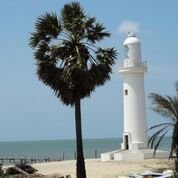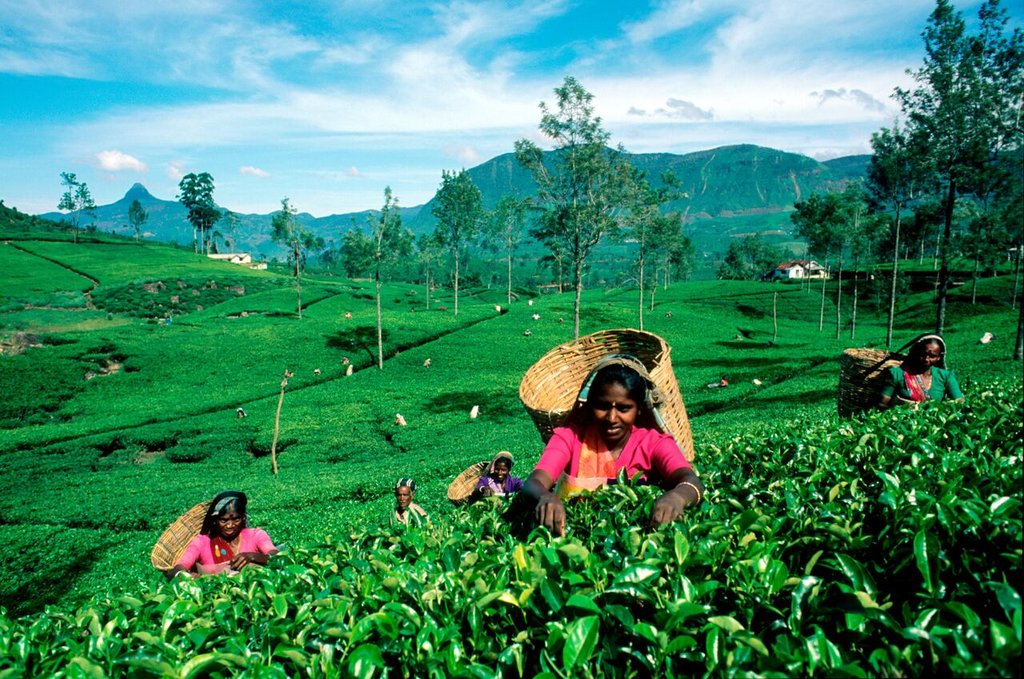Highlights
- Discover the second largest national park in Sri Lanka and its herds of elephants
- See the impressive temple in the mountains of Mihintale where Buddha stayed
- Explore the UNESCO World Heritage Site of Sigiriya, perched on a high plateau
- Visit the Tamarind Gardens to see exotic plants and flowers
- Relax at colonial fishing villages and beaches to gain a sense of the coastal lifestyle
Overview
On this 15-day journey, you'll visit a number of UNESCO World Heritage Sites around Sri Lanka. You will learn about Sri Lankan culture, food, art, and mythology, and meet the farmers of the tea plantations and the friendly people of the Jaffna District. You can also visit wildlife parks, home to abundant birds and elephants. As you travel to the mountains of Anuradhapura, Mihintale, you'll discover an entire ancient city, Polonnaruwa, and a complex system of Gal Vihara temples.
Detailed itinerary
Day 1: Airport – Negombo

Arrive at Negombo, a fishing town with a fascinating colonial past. British, Dutch, and Portuguese all fought over this town as it was a lucrative source of cinnamon, what was a highly sought after product in the spice trade. The cinnamon impacted the economic future of this town, but a stronger influence came from the colonizer’s historic Catholic church. Catholicism had such a strong influence on the society that it became known as “Little Rome’.
Today, Negombo is alive in its own blend of culture and religions. Colonial-style architecture remains in many of the buildings in Negombo, like the church, but local traditions appear to have outlived the colonizers. Take a tuk-tuk ride to visit the village and share a traditional lunch with locals. Join them on the beach at a lagoon famous for prawns, fish, crabs, and lobsters.
Day 2: Negombo – Mannar

Travel from Negombo to the island of Mannar, overlooking the Gulf of Mannar. Though visually dominated by Hindu temples, mosques, and churches, the town represents a diverse mix of different spiritual traditions. After a visit to town, walk to the Ketheeswaram temple, captured by the Dutch in 1658 and originally built in 1560 by the Portuguese. Though the interior is largely destroyed, the ramparts and bastions are intact and the shade of a giant balboa tree welcomes visitors.
Day 3: Mannar – Jaffna

Today, travel from the island of Mannar to the Jaffna District, the northernmost region of Sri Lanka. One of the oldest districts in lower South Asia, it is home to 900,000 people and marks one of the most densely populated areas of Sri Lanka. In Jaffna, meet friendly people with a rich culture in an ideal climate and setting.
Tamil speaking people populate the peninsula, which overlooks India over the Palk Strait and the Bay of Bengal. Here, elephants used to wade across the shallow lagoon that connects the Jaffna Peninsula with the rest of Sri Lanka. Enjoy an ideal setting of shallow lagoons and a number of interesting islands.
Day 4: Jaffna - Delft Island - Jaffna

Today, travel to the island of Neduntheevu, a 50-sq. km island about 30 kilometers away from the mainland. Known as Delft Island, it was strategically important during the Chola Dynasty, and the Portuguese, Dutch and the British Colonial Period. The island is surrounded by shallow waters and reefs making it difficult for ships to make an attack.
In the west of the island, visit ruins of South Indian Chola architecture and traditional dagoba. Walk by a pigeon house made of coral constructed by the Portuguese and Dutch. See the 'devils well', the source of drinking water for the entire island of 5000 people. People claim that since you can’t see the bottom of the well, it must be the devil's mouth. A few kilometers from the well, legend has it there’s a footprint that is also found on the nearby island of Nainativu. Christians believed Adam left his two footprints on the two islands.
Day 5: Jaffna - Point Pedro - Jaffna

Travel from Neduntheevu to Point Pedro, located at the northernmost point of the island. Relax on the island’s narrow white-sand beach overlooking a coral reef. By the road, visit fisherman of large rays, sharks, snapper and barracuda. In 2004, the tsunami devastated this community. Some parts of the town were submerged with seawater up to 4 feet deep. Fisherman’s boats were found 1 km. inland.
Chat with a local specialist who can help organize your trip.
Day 6: Jaffna - Mihintale - Sigiriya

Travel from the coast of Point Pedro to the mountains of Anuradhapura, Mihintale. These peaks are one of the sixteen places Solosmasthana, the Lord Buddha, visited in Sri Lanka. The Buddhists believe it to be one of the most important sacred places in the world. Mihintale is constructed of ancient stone architecture surrounding various Stupas, or monastic complexes. Many rock boulders and sacred caves, used by monks for meditation, are located in the jungle surrounding the main city of Anuradhapura.
Day 7: Sigiriya - Polonnaruwa

Travel from Anuradhapura, Mihintale to the UNESCO World Heritage Site of Sigiriya. This incredible structure rises nearly 700 feet above one of Asia’s most well-preserved ancient landscape gardens. The fortress, known as Lion’s Rock, forms a forbidding entrance to the Upper Palace. The Palace on the plateau, stretching across nearly 3.5 acres, was home to King Kasyapa for over 20 years. The Palace is still clearly visible as is the King’s throne his personal bathing pool.
Next, visit Polonnaruwa, one of Sri Lanka's ancient capital cities and part of the famous 'Cultural Triangle'. See the impressive and evocative Gal Vihara temple complex where three colossal granite statues of the Lord Buddha lay. A 2500 hectare tank called 'Parakrama Samudra', was constructed under King Parakramabahu’s reign. The city itself is divided into new and old town and can be easily explored on foot. The surrounding area's flat well- maintained roads also means you can jump on a bicycle to get around the well-preserved ruins.
Day 8: Polonnaruwa - Minneriya - Digana

Located between Habarana and Polonnaruwa, the 8,890 hectares of Minneriya National Park features the ancient Minneriya Tank. Constructed in an evergreen forest where sambar deer, leopards, and elephants roam, this tank was built in 3rdcentury AD by King Mahasena. During the dry season (June to September), this is an incredible place to observe the elephants and flocks of birds, such as cormorants and painted storks.
After the safari, you will be transferred to the Tamarind Gardens Ecolodge in Digana. This 10-acre property promotes a small domestic farm with mixed livestock as well as vegetable and fruit gardens. All meals are prepared with locally sourced produce and guests are invited to participate in the preparation of meals.
Day 9: Digana - Kandy

Kandy, the capital of the Central province is home to the Temple of the Tooth Relic, a World Cultural Heritage site. Strategically nestled amidst three mountain ranges and known as the gateway to the hill country, Kandy was initially built in this location as a natural fortress against attack as it was not an easy target for the foreign invaders. Nowadays, the city of Kandy is well known as one of Sri Lanka’s best attractions among both local and international tourists.
Day 10: Kandy – Nuwara Eliya
Nuwara Eliya often referred to as ‘Little England', has a cool climate unlike anywhere else in Sri Lanka due to its high elevation. The outskirts of Sri Lanka’s highest town still retain their ‘old world’ feel with many of the original Hotels still retaining their grandiose colonial style. Famous for its horse racing, Nuwara Eliya also boasts the impressive Golf Club which dates back to 1889. It is worthwhile to visit the Clubhouse to observe the photographs of life in Nuwara Eliya.
Ceylon Tea is one of the main exports of Sri Lanka. Visit a working plantation to gain a new perspective on this humble brew. Drive through the plantation where colorfully dressed Tea-Pickers work on sloping hills abundant with lush tea bushes. See the entire process, from tea bush to teapot.
Day 11: Nuwara Eliya – Horton Plains - Ella

The famous Horton Plains is a nature reserve characterized by a beautiful landscape of rolling hills, forests, and grassland. Spanning approximately 10,000 hectares, the park is home to 24 species of mammal such as elk, deer, giant squirrel, wild boar, wild hare, porcupine, and leopard. It is home to 87 bird species (14 of which are endemic), including many migratory birds. It also hosts a wide variety of flora, 57 species with 29 endemics to Sri Lanka. The Plains also feature many interesting attractions such as 'Bakers Falls', 'Chimmini Pool', and 'World's End footprint
Ella is a beautiful sleepy mountain village with an ideal cool climate of the central highlands. On a clear day, its view extends the south coast of Sri Lanka. Ella is also a perfect base for relaxing, with lots of fantastic walks through tea plantations to temples and waterfalls. With its perfect climate, this village soothes your mind and makes your day carefree and relaxing.
Day 12: Ella - Yala

Yala National Park, situated in the southeast region of the country covers almost 1000 square kilometers and is the second largest national park in Sri Lanka. Designated as a wildlife sanctuary in 1900, along with Wilpattu, it is one of the first two national parks in Sri Lanka. Leopards are the stars here, but it also has a large number of elephant herds. In addition, spotted deer, sambar, wild boar, wild buffaloes, sloth bear, jackal, mongoose as well as numerous birds inhabit this natural wilderness.
Day 13: Yala - Dondra Head - Mirissa

Visit Mirissa, an idyllic fishing village where you can enjoy walks along uncrowded beaches and visit stilt fishermen. Explore surrounding ancient temples and spice gardens, natural sanctuaries and exotic wildlife, and rubber and coconut plantations. Watch and participate in the traditional Devil Dance, a Southern Sri Lankan dance known for its healing powers. Devil Dancers are thought to help speed up the recovery process of illnesses.
Day 14: Mirissa – Colombo

Colombo is the home to a mixture of cultures. Attractions are strewn across the hustle and bustle of a lively city. Ancient Arab traders used to travel to these ports and the Portuguese, Dutch and British colonists once occupied the historic city. Explore historical cultural sights and learn about the country's past and its rich multi-cultural attractions.


